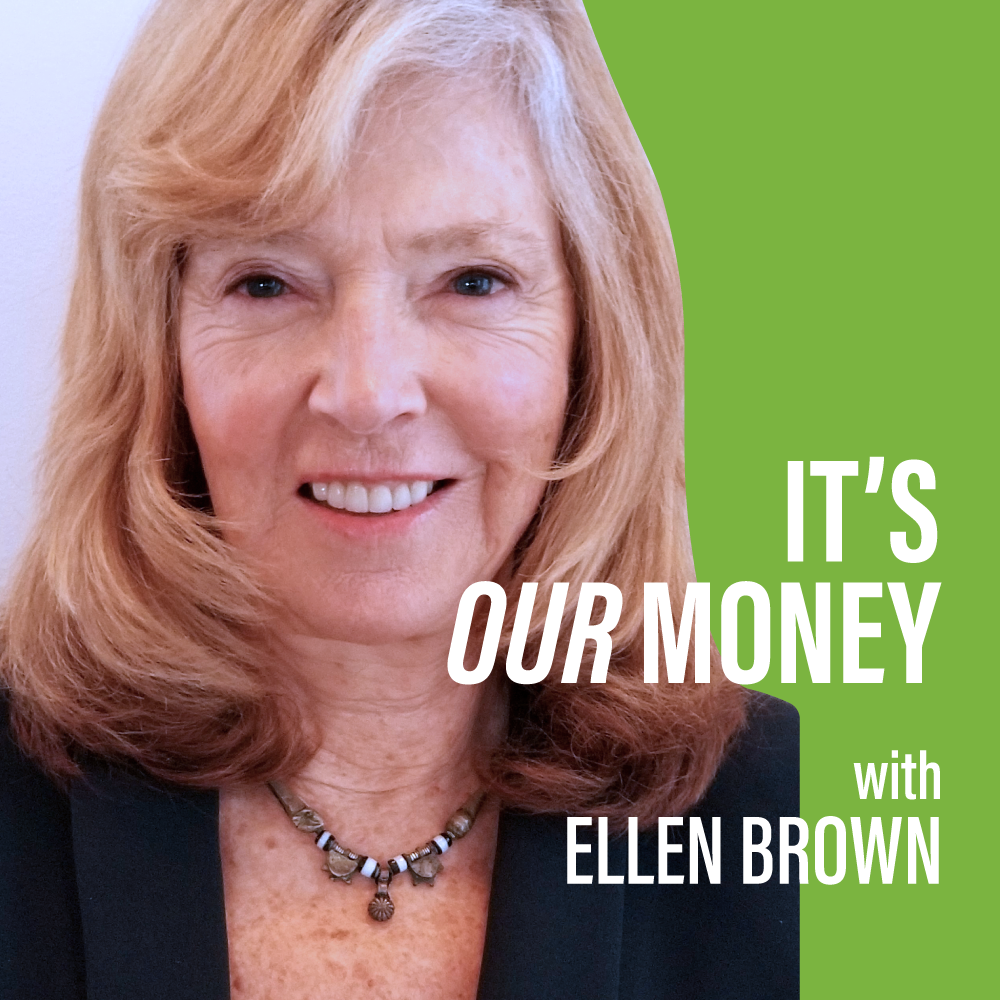The New York Times “Room for Debate” section just hosted a debate called “In Banking, Should There Be a ‘Public Option’?” My oped is here —
Public Banks Are Key to Capitalism
We actually need publicly owned banks for a capitalist market economy to run properly. Banking, money and credit are not market goods but are economic infrastructure, just as roads and bridges are physical infrastructure. By providing inexpensive, accessible financing to the free enterprise sector of the economy, public banks make commerce more vital and stable. Public banking is not a radical idea but has been practiced in the U.S. with excellent results for decades, and around the world for centuries.
Read more here.
Filed under: Ellen Brown Articles/Commentary |






Thanks again, Ellen!
We’ll be reprinting this…..
Best, Larry
>
There should be a Postal Savings Bank; it should make no loans and pay no interest and it should be free up to normal household limits on account size and number of transactions. And sometimes later, deposit insurance and the Fed should be abolished. This would, of course, lead to a massive run on the banks so a universal bailout of the entire population (similar to Steve Keen’s “A Modern Debt Jubilee”) with new fiat is needed till all deposits are 100% backed by reserves.
We make a huge mistake by allowing the banks and credit unions a default monopoly on the risk-free storage of and transactions with fiat. The ONLY proper provider of those services is the monetary sovereign since fiat is government money. By allowing the banks that default monopoly we enable a lot shenanigans by the banks with customer demand deposits.
Awesome, Ellen! Here’s the comment I just left:
Thank you, Ms. Brown!
As a teacher of economics, the cost-benefit analysis for public banking is clear: local governments can, and should, create their own credit at cost for infrastructure investment. For example, in California’s Bay Bridge upgrade, the cost was ~$7 billion with a finance cost of an additional $7 billion. With a state-owned bank, this simply and powerfully means the funding cost would be zero.
Let that sink in for its implications for all public infrastructure.
Benjamin Franklin was so astounded at this power, he wrote a pamphlet on the ability colonial Pennsylvania discovered to operate its government WITHOUT TAXES.
The Public Banking Institute held a conference this past June to explain and provide documentation of these benefits. Here is one article: http://www.washingtonsblog.com/2013/06/public-banking-conference-good-news-all-solutions-already-here-for-deficits-debt-full-employment.html
[…] Continue reading on ellenbrown.com […]
“…There should be a Postal Savings Bank; it should make no loans and pay no interest and it should be free up to normal household limits on account size and number of transactions…” & “…The ONLY proper provider of those services is the monetary sovereign since fiat is government money…” This concept already exists: its called GOLD and SILVER EAGLES. You don’t need a post office!
Inexpensive fiat is the ONLY ethical money form for government debts else some private interest is profiting off the taxation authority and power of government. Do you want that? If so, you need only look in a mirror to see a fascist. The ONLY ethical place for gold and silver is the private sector for private debts ONLY assuming people will accept them in a true free market of private money creation.
Let’s move on from worshiping shiny metals to worshiping justice and ethics, eh? Let’s not return to our vomit since that does not please God.
[…] NYT, Room for Debate — “In Banking, Should There Be a ‘Public Option’?” […]
Thank you for another great article, Ellen Brown.
“In banking, there SHOULD be a public option.” It just makes sense. Banks like the Bank of North Dakota would work to revive state, local, and county municipalities. BND has a proven 100-year successful record.
Hi Ellen! I was pretty amazed that NYT carried your editorial, but I’m glad they did. I admire your work greatly. I hope you can continue to get the word out about debt-free money and public banking into the mainstream media.
[…] NYT, ROOM FOR DEBATE — “IN BANKING, SHOULD THERE BE A ‘PUBLIC OPTION’?” […]
Why are “qualified” investors not a government regulated, structured tier designed to commit capital back to long-term projects?
Why say, after your first billion, can the government not limit your investing to bonds, insurance bonds, municipal and national? That way money alone is not monopolizing any one particular good, skewing the reality or fundamentals behind the actual trade in said good. Billionaires should be limited only to start-up businesses and bonds and a whole new class of bond should be created to insure the public against Wall Street traders and financial corruption.
The “bond” should act as indemnity and surety against fraud by forcing hedge funds, investment banks and the actual creator or issuer as well as his employees to be insured against fraud. Billionaires and the super-wealthy should be forced to insure the finance industry so that the little investor no longer has to bail out the bigger one. The amount of indemnity per investment offering should be tired based on proven history of company and seller so that over time the insurance can be lessened from say 90% to 10% of face value meaning that long-term, proven fund managers get advantages over newbies.
The public should never, ever, be on the hook for a billionaire’s personal or business investments. The money should come from his own peers and that will enact something no government has ever been able to do; industry-wide, self-regulation.
Are we a moral nation or not?